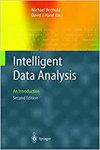Incremental density clustering framework based on dynamic microlocal clusters
IF 0.8
4区 计算机科学
Q4 COMPUTER SCIENCE, ARTIFICIAL INTELLIGENCE
引用次数: 0
Abstract
With the prevailing development of the internet and sensors, various streaming raw data are generated continually. However, traditional clustering algorithms are unfavorable for discovering the underlying patterns of incremental data in time; clustering accuracy cannot be assured if fixed parameters clustering algorithms are used to handle incremental data. In this paper, an Incremental-Density-Micro-Clustering (IDMC) framework is proposed to address this concern. To reduce the succeeding clustering computation, we design the Dynamic-microlocal-clustering method to merge samples from streaming data into dynamic microlocal clusters. Beyond that, the Density-center-based neighborhood search method is proposed for periodically merging microlocal clusters to global clusters automatically; at the same time, these global clusters are updated by the Dynamic-cluster-increasing method with data streaming in each period. In this way, IDMC processes sensor data with less computational time and memory, improves the clustering performance, and simplifies the parameter choosing in conventional and stream data clustering. Finally, experiments are conducted to validate the proposed clustering framework on UCI datasets and streaming data generated by IoT sensors. As a result, this work advances the state-of-the-art of incremental clustering algorithms in the field of sensors’ streaming data analysis.基于动态微局部聚类的增量密度聚类框架
随着互联网和传感器的不断发展,各种流原始数据不断产生。然而,传统的聚类算法不利于及时发现增量数据的潜在模式;采用固定参数聚类算法处理增量数据,不能保证聚类精度。本文提出了一个增量-密度-微聚类(IDMC)框架来解决这一问题。为了减少后续的聚类计算,我们设计了动态微局部聚类方法,将流数据中的样本合并到动态微局部聚类中。在此基础上,提出了基于密度中心的邻域搜索方法,实现微局部聚类与全局聚类的周期性自动合并;同时,采用动态增加聚类的方法对全局聚类进行更新,每个周期都有数据流。这样,IDMC以更少的计算时间和内存处理传感器数据,提高了聚类性能,简化了传统和流数据聚类的参数选择。最后,在UCI数据集和物联网传感器生成的流数据上进行了实验,验证了所提出的聚类框架。因此,本工作在传感器流数据分析领域推进了增量聚类算法的最新进展。
本文章由计算机程序翻译,如有差异,请以英文原文为准。
求助全文
约1分钟内获得全文
求助全文
来源期刊

Intelligent Data Analysis
工程技术-计算机:人工智能
CiteScore
2.20
自引率
5.90%
发文量
85
审稿时长
3.3 months
期刊介绍:
Intelligent Data Analysis provides a forum for the examination of issues related to the research and applications of Artificial Intelligence techniques in data analysis across a variety of disciplines. These techniques include (but are not limited to): all areas of data visualization, data pre-processing (fusion, editing, transformation, filtering, sampling), data engineering, database mining techniques, tools and applications, use of domain knowledge in data analysis, big data applications, evolutionary algorithms, machine learning, neural nets, fuzzy logic, statistical pattern recognition, knowledge filtering, and post-processing. In particular, papers are preferred that discuss development of new AI related data analysis architectures, methodologies, and techniques and their applications to various domains.
 求助内容:
求助内容: 应助结果提醒方式:
应助结果提醒方式:


